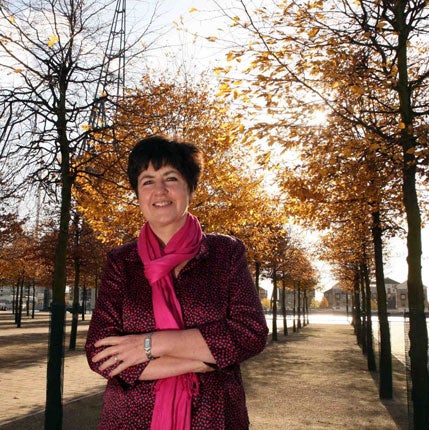Hughes’s circular journey on the road less travelled
As travel magazine ‘Wanderlust’ celebrates its 100th issue, Lyn Hughes tells Sophie Morris about its beginnings

Your support helps us to tell the story
From reproductive rights to climate change to Big Tech, The Independent is on the ground when the story is developing. Whether it's investigating the financials of Elon Musk's pro-Trump PAC or producing our latest documentary, 'The A Word', which shines a light on the American women fighting for reproductive rights, we know how important it is to parse out the facts from the messaging.
At such a critical moment in US history, we need reporters on the ground. Your donation allows us to keep sending journalists to speak to both sides of the story.
The Independent is trusted by Americans across the entire political spectrum. And unlike many other quality news outlets, we choose not to lock Americans out of our reporting and analysis with paywalls. We believe quality journalism should be available to everyone, paid for by those who can afford it.
Your support makes all the difference.Lyn Hughes is an old hand at turning a journey into an adventure. To get to London’s Excel Centre for the World Travel Market on the morning we meet she passed on the train to sail down the river from Windsor on a boat laid on by tourism representatives from the Canary Islands.
The group were forced to disembark some distance away from the exhibition hall and join the crowds pushing their way towards Excel by bus and tram, but she arrives unflustered. No doubt she has endured far worse in her capacity as the editor-in-chief of Wanderlust magazine, the glossy handbook for independent travellers.
The idea of going to a package destination fills Hughes with dread. She is being gently persuaded that Tenerife boasts amazing wildlife and natural terrain, but is adamant she won’t be pushed into staying in a resort hotel, as she once had to for a meeting in Gran Canaria. Nor will she be rushing to board an organised tour bus, as happened in Gambia, a sun package destination. Once she escaped upriver to see the chimps, though, she met brethren in the shape of Wanderlust readers – an occupational hazard wherever she goes in the world, and in the past year she has been away at least once a month.
Gran Canaria and Gambia are the only two travel experiences where Hughes has followed the crowd rather than struck out on her own.
She sets a fine example to loyal Wanderlust devotees, many of whom have read the magazine since its journey began 15 years ago; this month the Wanderlust team are celebrating 100 issues. From an initial print run of 5,000 its circulation is now 38,000, and 23,000 of these are subscribers.
Hughes began her career in marketing, falling for a colleague, Paul Morisson, when they discovered a mutual love of travel. Instead of sitting out the last recession, in 1992 the pair headed for South America. They packed so lightly they found themselves with nothing to read on the plane out to Ecuador, and began to brainstorm their perfect travel magazine.
When the couple returned from their South American adventure they dedicated themselves to the plan. “Wanderlust is not about any type of person or demographic,” says Hughes. “It’s more about an attitude.”
Hughes’s husband Morisson, who lost his battle with cancer in 2004, wrote about 40 per cent of that first issue, but freelance writers and photographers found them very quickly.
Hughes kept the magazine together while mourning Morisson, but a new threat has appeared in the shape of Lonely Planet magazine, which planned to launch last week, on exactly the same day Wanderlust’s 100th issue was to hit the newsstands. Hughes says the other big travel magazines, Condé Nast Traveller and The Sunday Times Travel magazine, attract very different markets to her explorers and backpackers, and she objects to the fact it is being launched by BBC Worldwide, the BBC’s consumer arm.
This, she says, gives it an unfair advantage because it can benefit from the BBC brand and they can run the magazine at a loss, though her complaint has not been upheld by the Office of Fair Trading. When BBC Worldwide bought a 75 per cent stake in the Lonely Planet publishing company last year it drew criticism that the move was far wide of the BBC’s public service remit. Earlier this month Hughes told a Culture, Media and Sport Select Committee, “BBC Worldwide used to argue that its magazines were in support |of TV programming. They do not have a Lonely Planet TV programme, so why are they launching a Lonely Planet magazine?”
Hughes claims the BBC has been trying to undercut her by offering her advertisers cut-price rates. The BBC denies there have been aggressive advertising techniques, and told the Select Committee, “We have many relationships with other publishers… and we made clear to Wanderlust we would be open to working with them in the same way: we like their title, and want it to succeed.”
For a long time Wanderlust was as fiercely independent as the brand of travel it espoused, and its permanent staff of 24 works from a Windsor office. Hughes still owns 50 per cent of the business, publishers John Brown and Mark Ellingham of Rough Guides also each own stakes, and Haymarket recently bought 25 per cent. Hughes doesn’t feel her integrity is compromised, and says she is benefiting from Haymarket’s publishing experience.
In the 100th issue, Hughes comes full circle on her adventures in travel and travel writing by returning to Quito in Ecuador, 15 years after she first set foot there with Morisson, and devised Wanderlust.
Join our commenting forum
Join thought-provoking conversations, follow other Independent readers and see their replies
Comments